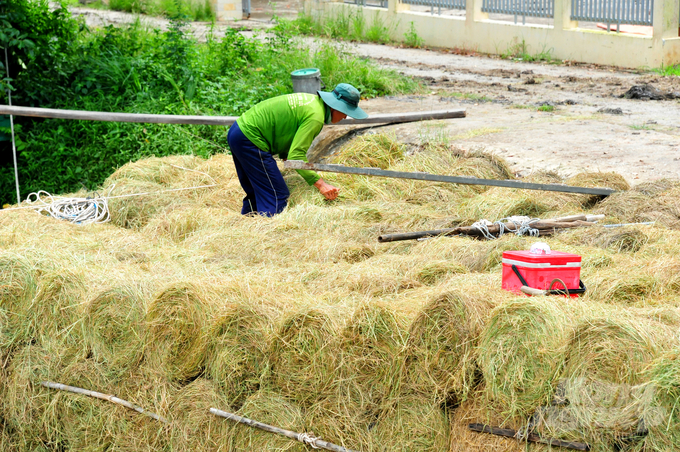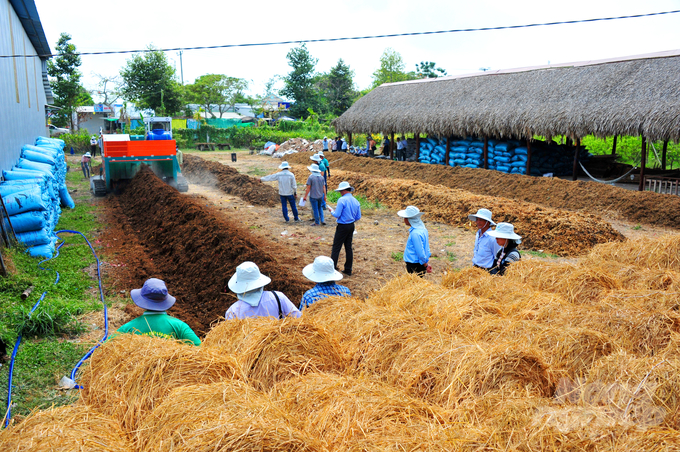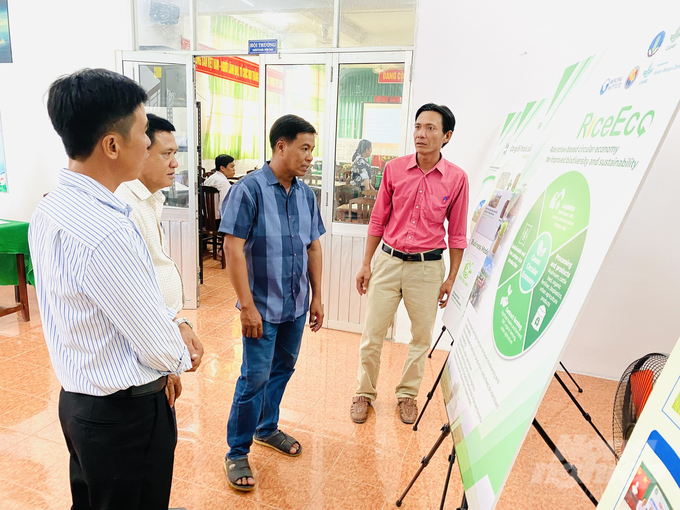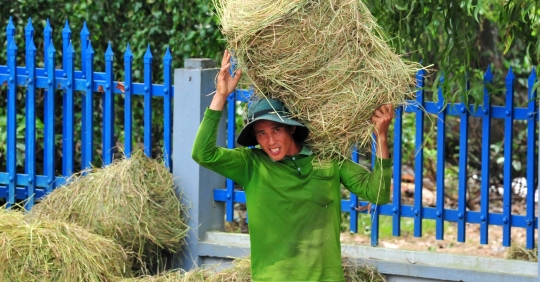Recently, Can Tho’s plantation and crop protection department, in cooperation with the International Rice Research Institute (IRRI), hosted a straw product value chain stakeholder meeting to promote innovation in the straw value chain. Rice straw and strengthen links and cooperation, accelerate the application of sustainable management measures, avoid burning straw in the fields, thereby contributing to the development of green agriculture and sustainable rural areas.

Currently, the Mekong Delta produces about 30 million tons of rice straw per year. It is estimated that only about 30% of straw is collected for mushroom production, stump cover and animal feed. Picture: Le Hoang Vu.
Ms. Dinh Thi Kim Dung, bureau chief of the International Rice Research Institute in Vietnam, said the Mekong Delta currently produces about 25 million tons of rice per year and about 30 million tons of rice straw. However, it is estimated that only about 30% of the straw is collected for mushroom production, mulching, animal feed, etc. and 70% of the straw is burned in the field. This leads to nutrient losses and pollutes the environment or the ingress of straw on flooded fields leads to increased greenhouse gas emissions. The main reason for this situation lies partly in the lack of technological solutions for the collection, treatment and processing of straw, as well as the low value of straw.
Therefore, in the past period, IRRI has coordinated with the agricultural sector of Can Tho city and Mekong Delta localities to carry out numerous training activities, help farmers to apply straw collection mechanization and develop livelihood development models and income from straw such as using straw to grow straw mushrooms, making potted plants, making organic fertilizers…
In particular, as part of the project “Promoting Innovation in Straw Value Chain in Vietnam”, IRRI has also coordinated with relevant entities to promote survey, research and support activities for farmers in this field. Development of value chains for straw products.

Currently, a number of cooperatives in Can Tho city have been producing and commercializing organic fertilizer from straw using technology supported by IRRI. Picture: Le Hoang Vu.
Currently, IRRI is coordinating with agencies and units to implement activities to support farmers in using and promoting the value of rice straw and providing information on collection and production development. Trade in rice straw products in the Mekong Delta.
In addition, the IRRI research team recently presents results from surveys, market research surveys and value chain studies of straw products. Since then, farmers and related parties have exchanged ideas, proposed innovations and offered solutions to eliminate difficulties, promote connections and develop the value chain of straw products according to market demand. We propose new ideas and directions to collect and use rice straw effectively and develop many high value-added products, thereby expanding the consumption market. In addition, IRRI supports farmers to advance the mechanization of straw collection and to form groups and groups for collection services.

Farmers in the Mekong Delta learn about the process of mechanization to produce organic fertilizer from straw. Picture: Le Hoang Vu.
Ms. Pham Thi Minh Hieu, Director of Can Tho’s Crop Protection and Cultivation Department, said that Can Tho’s Plantation and Crop Protection Department has coordinated with IRRI on several rice harvests in the past to promote the development of product value chains. Straw products or rice cultivation using straw organic fertilizers to reduce the cost of using chemical fertilizers by 35-40% while increasing the profit by 10% in the same area compared to traditional production. .
From practical models using rice straw by-products, there are now some cooperatives in Can Tho city that can produce organic fertilizer from straw with IRRI-supported technology and sell it to many people. known and used. This creates a new direction to produce value-added products from rice straw, helping to harness the by-products in the rice growing process, thereby changing farmers’ straw-management practices.
According to Ms. Hieu, when farmers were done harvesting rice, they would no longer often bury the straw or burn it in the field, now farmers will resort to using straw rolling machines to make products from straw. Specifically, it is about producing organic fertilizer from straw and biodegradable products from straw, increasing the income of farmers and helping to protect the ecological environment…

